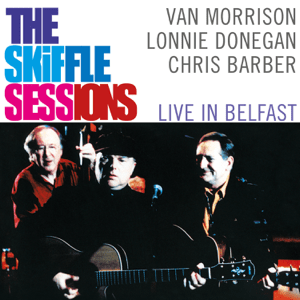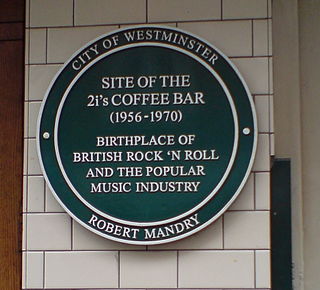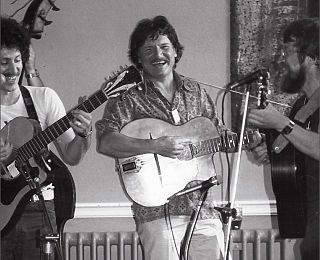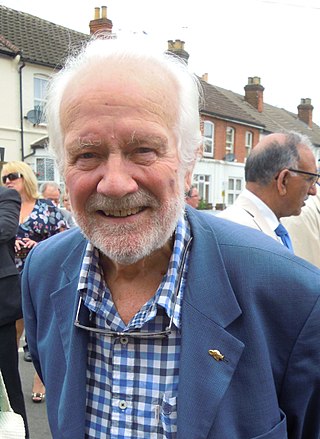
The Quarrymen are a British skiffle/rock and roll group, formed by John Lennon in Liverpool in 1956, which evolved into the Beatles in 1960. Originally consisting of Lennon and several schoolfriends, the Quarrymen took their name from a line in the school song of their school, the Quarry Bank High School. Lennon's mother, Julia, taught her son to play the banjo, showed Lennon and Eric Griffiths how to tune their guitars in a similar way to the banjo, and taught them simple chords and songs.
Skiffle is a genre of folk music with influences from American folk music, blues, country, bluegrass, and jazz, generally performed with a mixture of manufactured and homemade or improvised instruments. Originating as a form in the United States in the first half of the 20th century, it became extremely popular in United Kingdom in the 1950s, where it was played by such artists as Lonnie Donegan, The Vipers Skiffle Group, Ken Colyer, and Chas McDevitt. Skiffle was a major part of the early careers of some musicians who later became prominent jazz, pop, blues, folk, and rock performers, The Quarrymen and Rory Gallagher among them. It has been seen as a critical stepping stone to the second British folk revival, the British blues boom, and the British Invasion of American popular music.

Anthony James Donegan, known as Lonnie Donegan, was a British skiffle singer, songwriter and musician, referred to as the "King of Skiffle", who influenced 1960s British pop and rock musicians. Born in Scotland and brought up in England, Donegan began his career in the British trad jazz revival but transitioned to skiffle in the mid-1950s, rising to prominence with a hit recording of the American folk song "Rock Island Line" which helped spur the broader UK skiffle movement.

Hank Brian Marvin is an English multi-instrumentalist, vocalist, and songwriter. He is widely known as the lead guitarist for the Shadows, a group which primarily performed instrumentals and was the backing band for Cliff Richard, and subsequently for Marvin, Welch & Farrar.

Silly Wizard was a Scottish folk band that began forming in Edinburgh in 1970. The founder members were two like-minded university students—Gordon Jones, and Bob Thomas. In January 1972, Jones and Thomas formed a trio with their flatmate Bill Watkins and performed under various band names in Edinburgh folk clubs. In the spring of 1972, Watkins returned to Birmingham and, in June 1972, Chris Pritchard (vocals) came in as his replacement. In July 1972, this newly formed trio were offered their first paid booking at the Burns Monument Hotel, Brig O' Doon, Scotland, and needed a band name in a hurry. The name "Silly Wizard" was chosen and the continuing stream of bookings ensured that the name became permanent. In September 1972, the trio recruited Johnny Cunningham (1957–2003) and Silly Wizard started to take off.

Rory Storm was an English musician and vocalist. Born in Liverpool, Storm was the singer and leader of Rory Storm and the Hurricanes, a Liverpudlian band who were contemporaries of The Beatles in the late 1950s and early 1960s. Ringo Starr was the drummer for the Hurricanes before joining the Beatles in August 1962.

The Country Gentlemen was a progressive bluegrass band that originated during the 1950s in the area of Washington, D.C., United States, and recorded and toured with various members until the death in 2004 of Charlie Waller, one of the group's founders who in its later years served as the group's leader.

Elizabeth "Libba" Cotten was an American folk and blues musician. She was a self-taught left-handed guitarist who played a guitar strung for a right-handed player, but played it upside down. This position meant that she would play the bass lines with her fingers and the melody with her thumb. Her signature alternating bass style has become known as "Cotten picking". NPR stated "her influence has reverberated through the generations, permeating every genre of music."

The Swinging Blue Jeans are a four-piece 1960s British Merseybeat band, best known for their hit singles with the HMV label: "Hippy Hippy Shake", "Good Golly Miss Molly", and "You're No Good", issued in 1964. Subsequent singles released that year and the next made no impression. In 1966, their version of Burt Bacharach and Hal David's "Don't Make Me Over" peaked at no. 31 in the UK Singles Chart, but the group never charted again.

The Skiffle Sessions – Live in Belfast is a live album by Northern Irish singer-songwriter Van Morrison, with Lonnie Donegan and Chris Barber, released in 2000. Lonnie Donegan had played with the Chris Barber jazz band when he had his first hit with "Rock Island Line"/"John Henry" in 1955. He had been a childhood influence on Van Morrison, who had performed in his own skiffle band with schoolmates when he was twelve years old in Belfast, Northern Ireland. This was Donegan's second album in twenty years, reviving his career until his death in 2002.
"Cotton Fields (The Cotton Song)" (also known as In Them Old Cotton Fields Back Home) is a song written by American blues musician Huddie Ledbetter, better known as Lead Belly, who made the first recording of the song in 1940.

The 2i's Coffee Bar was a coffeehouse at 59 Old Compton Street in Soho, London, that was open from 1956 to 1970. It played a formative role in the emergence of Britain's skiffle and rock and roll music culture in the late 1950s, and several major stars including Tommy Steele and Cliff Richard were first discovered performing there.

William Charles "Diz" Disley was an Anglo-Canadian jazz guitarist and banjoist. He is best known for his acoustic jazz guitar playing, strongly influenced by Django Reinhardt, for his contributions to the UK trad jazz, skiffle and folk scenes as a performer and humorist, and for his collaborations with the violinist Stéphane Grappelli.

Charles James McDevitt is a Scottish musician, one of the leading lights of the skiffle genre which was highly influential and popular in the United Kingdom in the mid-to-late 1950s.
Nancy Whiskey was a Scottish folk singer, best known for the 1957 hit song, "Freight Train".

Will the Circle Be Unbroken: Volume Two is the nineteenth studio album by American country folk group Nitty Gritty Dirt Band, released on May 1, 1989. The album follows the same concept as the band's 1972 album, Will the Circle Be Unbroken, which featured guest performances from many notable country music stars.

The Echoes were an English musical group, established in London in early 1960 by singer Chris Wayne, for the Johnny Preston, Conway Twitty and Freddy Cannon tour of Great Britain. During the period 1960 to 1971, the Echoes toured extensively throughout the United Kingdom and elsewhere in the world, playing for various artists and providing the backing on many recordings.
Saturday Club was an influential BBC Radio programme in the United Kingdom, broadcast on the BBC Light Programme and later BBC Radio 1 between 1957 and 1969. It was one of the earliest – and for several years almost the only – radio programme in the country to broadcast pop music. Its longest-serving and best remembered host was Brian Matthew.
"Freight Train" is an American folk song written by Elizabeth Cotten in the early 20th century, and popularized during the American folk revival and British skiffle period of the 1950s and 1960s. By Cotten's own account in the 1985 BBC series Down Home, she composed "Freight Train" as a teenager, inspired by the sound of the trains rolling in on the tracks near her home in North Carolina.
Christopher Mark Bailey was an Australian bass guitarist and vocalist. He was a member of various rock groups including Headband (1971–1974), The Angels, Gang Gajang (1984–2013), and The Stetsons. Bailey died of throat cancer, aged 62.













